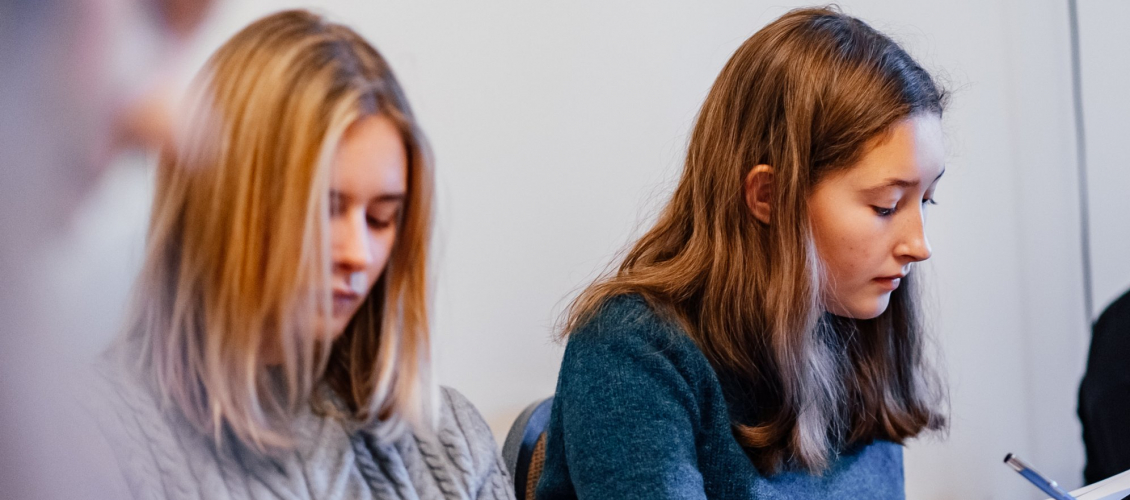These courses are:
- Civic Engagement (instructors: Natalya Mikhailova and Kseniya Shtalenkova);
- Freedom of Expression (instructors: Kseniya Shtalenkova and Maria Laktionkina).
To learn more about the courses, please see the descriptions below. The registration deadline is February 10th. To enroll in the course, please use the following form.
NB: Each student can choose only one course. A maximum number of students in each group for 2022 is no more than 15!
The courses are free for all EHU students! Please see details on requirements to enroll in each course in descriptions, provided below.
Please note that OSUN Network Collaborative courses are obligatory for the students, who are planning to apply for an academic exchange program at Bard College. The OSUN Network Collaborative courses are taught by the faculty from EHU and OSUN Network of partner institutions, this semester including: Al-Quds Bard Partnership, American University in Central Asia, Bard College in Annandale-on-Hudson, Bard College Berlin, BRAC University, and Central European University.
CIVIC ENGAGEMENT
Course duration: March–June, 2022.
Modes: hybrid (class meetings / zoom).
Credits: 6 ECTS.
NB: The Civic Engagement Network course is also obligatory for the students, who would like to submit their projects to the Get Engaged Conference in 2022.
Course summary:
The course will explore historical, philosophical and practical elements of civic engagement while investigating the underlying question of what it means to be an engaged citizen in the early XXI century. Together with guest lecturers and experts, combining out-of-class fieldwork, case studies and creating our own projects, we will examine modes of community engagement on a number of levels, focusing on readings and activities that help us to hone skills for creating successful communities. Along with invited guest speakers, the course will have a panel with students who have led successful projects and will organize workshops on practical steps of developing civic engagement projects. A selection of final projects will be featured in an end-of-term presentation to the Network. The most powerful projects will be selected to be presented at the Get Engaged Conference 2022–2022.
Core questions:
- What is a good citizen/civil society?
- How do you act within the bounds of existing civil society? How do citizens/students act locally, nationally and globally?
- What are challenges to civil society? What if there is little/no civil society?
- How do we do a project?
- What do you do when politics is not enough?
- What do we do after we fail?
Assignments:
- the prompt paper “What does it mean to be an engaged citizen?”;
- reflection paper on a historical “mentor” on civic engagement;
- keynote lecture and linkages with partner institutions;
- final community-based project (including an interview with an expert, conceptual map and final presentation).
Criteria for participation:
- genuine interest in collaboration and creation of community projects;
- English B2 (written and spoken);
- projects in progress are highly welcomed to be continued, as well as ideas for new projects to be developed and implemented within the class!
For further questions, feel free to contact Kseniya Shtalenkova directly via kseniya.shtalenkova@ehu.lt
FREEDOM OF EXPRESSION
Course duration: March–June, 2022.
Modes: hybrid (class meetings / zoom).
Credits: 6 ECTS.
Course summary:
The language of freedom of speech is often invoked to defend those who speak truth to power. Free speech can be seen as the language of political resistance, as we saw when Vaclav Havel spoke up against the Czech Communist regime or when American football players kneel during the national anthem. But freedom of speech also is invoked to protect satirical criticism as in the case of Charlie Hebdo and the Danish Cartoons’ depiction of the Prophet Mohammed. And today free speech is frequently invoked in the name of conservative provocateurs like Geert Wilders or Milo Yiannopolous. Year 2020 with the spread of the Covid-19 and rising of civic awareness during political protests in Belarus, Kyrgyzstan, Armenia, Germany or France also proved that the freedom of expression is still an issue both in European and global contexts. Many see free speech as the fundamental right of individual liberty and self-expression, which is why it is guaranteed in Article 19 of the International Declaration of Human Rights. Even for those who reject the idea that unrestricted speech will lead to political truths, the free expression of competing ideas girds a pluralist society where disagreement and dissent are prized. On another side, however, uncensored speech can lead to dangerous and at times painful ideas. Should anti-democratic groups be free to argue democratically against democracy? Should racist and sexist speech be permitted when it cows certain people from the public sphere, thus limiting their right to public engagement? Questions of the freedom of speech and ideas go to the heart of our global, liberal, and democratic community. The incredible ferment around the extent of free speech today shows how unsettled this community is. The course will explore the historical, constitutional, legal, social and political implications of freedom of expression both in global and regional contexts.
Core questions:
- What is free speech and why is it an impossible thing in the real world?
- What is the difference between protecting dignity and protecting from offence?
- What is hate speech?
- What are the mechanisms of censorship?
- What is academic freedom?
- What is freedom of expression in the digital era?
Assignments:
- Image and caption “In your view, what constitutes or limits Freedom of Expression?”;
- debates;
- keynote lecture and linkages with partner institutions;
- final case studies essay.
Criteria for participation:
- genuine interest in collaboration and studies of free speech cases;
- English B2 (written and spoken);
- participation in the EHU Debate Club or your interest in debating may count as an extra point towards enrollment in this course!
For further questions, feel free to contact Kseniya Shtalenkova directly via kseniya.shtalenkova@ehu.lt
